Four Sisters, Learning How to Sail Their Ships

It's hard not to love the March girls of Concord, Massachusettes, so deeply etched are Jo, Meg, Beth and Amy on the cultural and emotional landscape that they resurface from generation to generation like cherished friends.
The theme of family solidarity, plus the light blend of romance and budding feminism depicted through believable characters has kept this quintessential literary standard by Louisa May Alcott in the forefront for over 150 years.
Indeed, these four women on the brink of emancipation shatter the traditional image of upper-middle class young ladies whose role (and even duty) was to get married and comply with the rules society had set for them. Directed by Casey Long, this condensed musical take on this famed classic is not only liberating but heartwarming, and is now underway at Chance Theater through December 23rd, hitting just the right emotional notes with audiences.
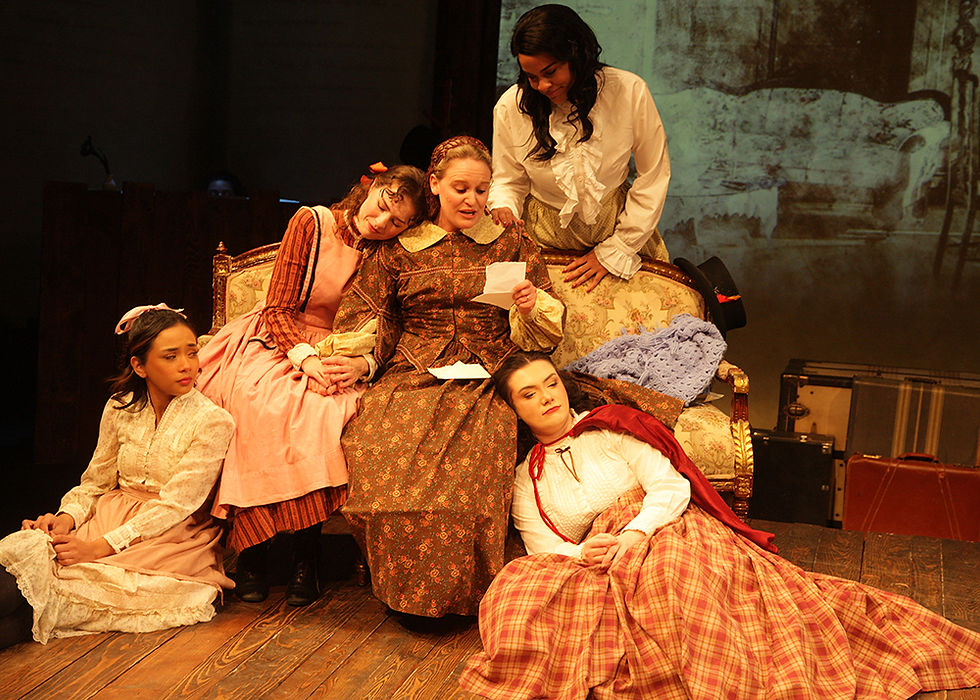
Pulsing with a generous affection for its source material, with lively characters brought to life from an adaptation by Allan Knee (best known for “The Man Who Was Peter Pan,” the source for the film, “Finding Neverland”), a familiar songbook of period waltzes, polkas, and quadrilles from Jason Howland provides an overall tapestry, gamely supported by Mindi Dickstein's lyrics.
We are first introduced to Jo in New York in 1865, where she's come from her home in Concord, Massachusetts to make her way as a writer at a time when publishers notoriously wrote rejection letters back to young female authors, urging them to "go home and have babies." It also introduces Professor Bhaer (Tucker Boyes, “The Secret Garden”), a gentle German scholar, friend and mentor, and paves the way later for a more romantic turn of events. Thus, our story begins on Christmas, two years before, in the attic of the March household.
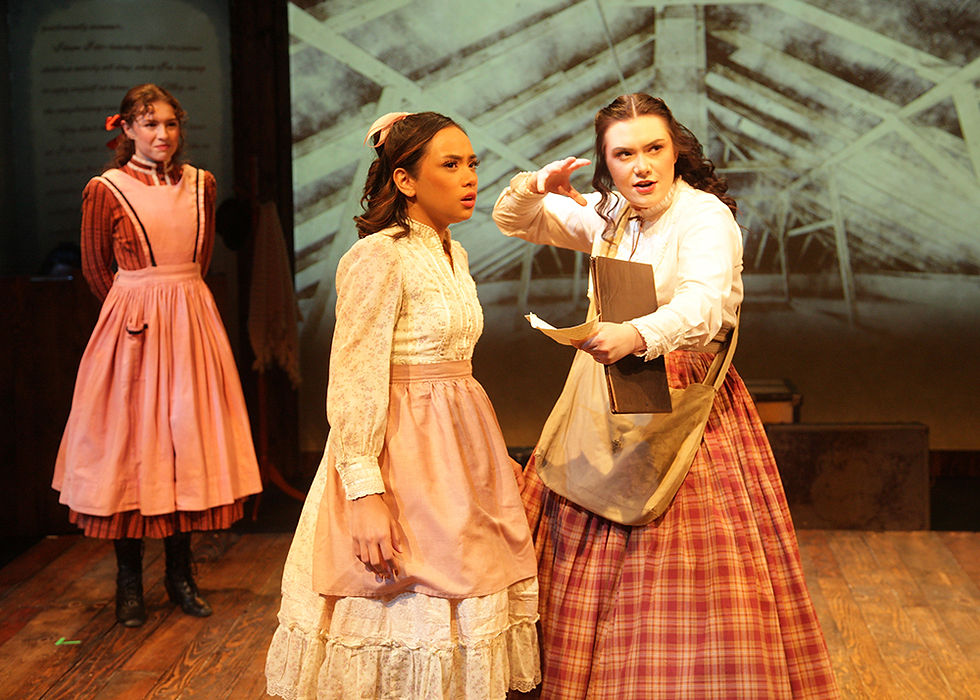
It really is a charming story, filled with personal discovery, heartache, hope and everlasting love, center-staged with an entrancing turn by its engaging lead, Sarah Pierce (“Edges,” “Ragtime,” “The Who’s Tommy”) as Alcott's deliciously hoydenish, brassy, proto-feminist heroine. Reacting with impatience to the many limitations placed on women and girls, Jo hates romance in her real life, and wants nothing more than to simply hold her family together.
With just ten actors and musical director Gabrielle Maldonado on the keyboard, “Little Women, The Broadway Musical” is a chamber musical with all the elements of a big show: a cast of veteran artists, a critically acclaimed director with impeccable show credentials, and a top caliber creative team.
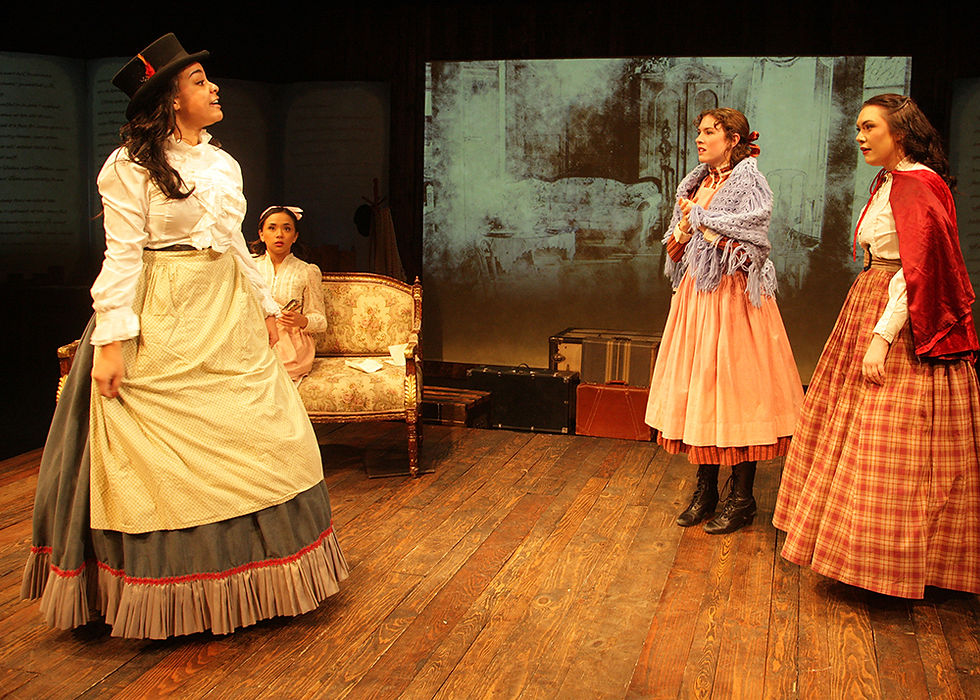
Unfortunately, it’s not all peaches and cream in the March family. But Louisa May Alcott’s classic story has always worked, whether as a book (1868), a play (1912), a TV movie (1978), or the musical theatre version, which officially opened on Broadway in 2005, directed by Susan Schulman. And there was, of course, the 1933 Hepburn film; another starring June Allyson in 1949; and the 1994 version with Wynona Ryder and Claire Danes.
In all cases, the focus is on the March family — there is traditional Meg, who dreams of getting married and having children; feisty, opinionated, aspiring writer Jo; sweet, selfless, perfectly content Beth who only wants to be surrounded by family, and romantic Amy, the baby of the family — a stunning artist who works hard to be included.
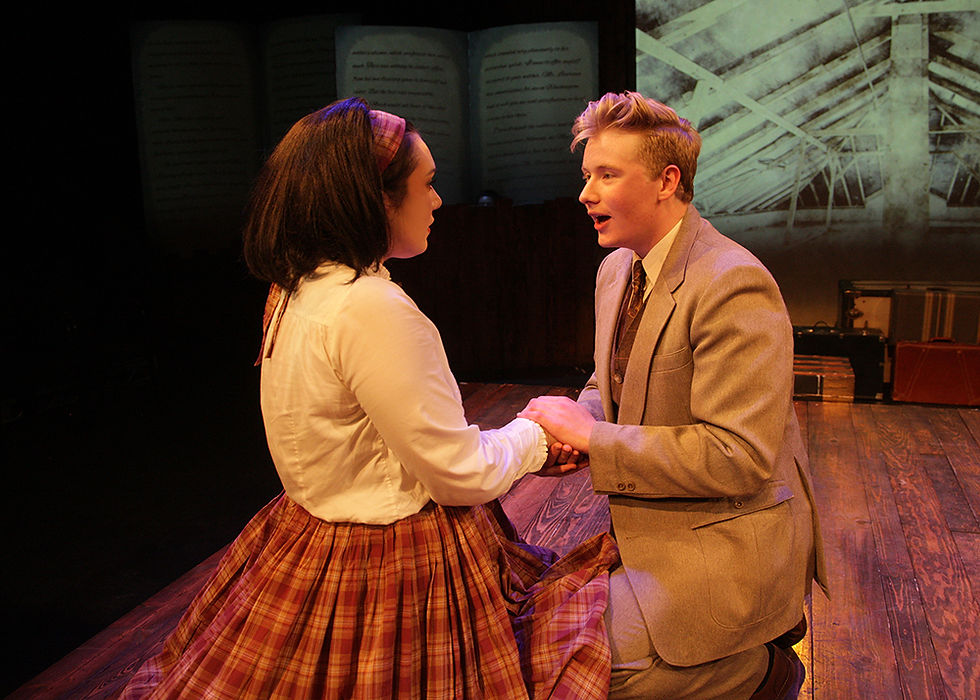
Intercut with the vignettes in which their family lives unfold are several recreations of the melodramatic short stories Jo writes in her attic studio, and the scenes are handled with much vigor and gusto. The tomboyish Jo is shown at first in a New York prologue, musically acting out the parts of her blood-and-guts short story for infatuated friend Professor Bhaer (Mr. Boyes at his best), and her landlady Miss Kirk (Jennifer Sparks, “Beauty and the Beast”). More on her later.
In "An Operatic Tragedy," the number begins as dialogue and metamorphosizes into the characters of the story coming to life all around the stage, while Jo mimics the actors (a fictionalized Clarissa, Braxton and Rodrigo) with perfect timing between speaking, singing and lip-synching. Ms. Pierce, the de facto center of the novel, is a joy to watch. Her rendition of “Astonishing” at the end of the first act achieved new heights of theatrical excitement, and her vibrant “Better” and “The Fire Within Me” brought chills to the audience.
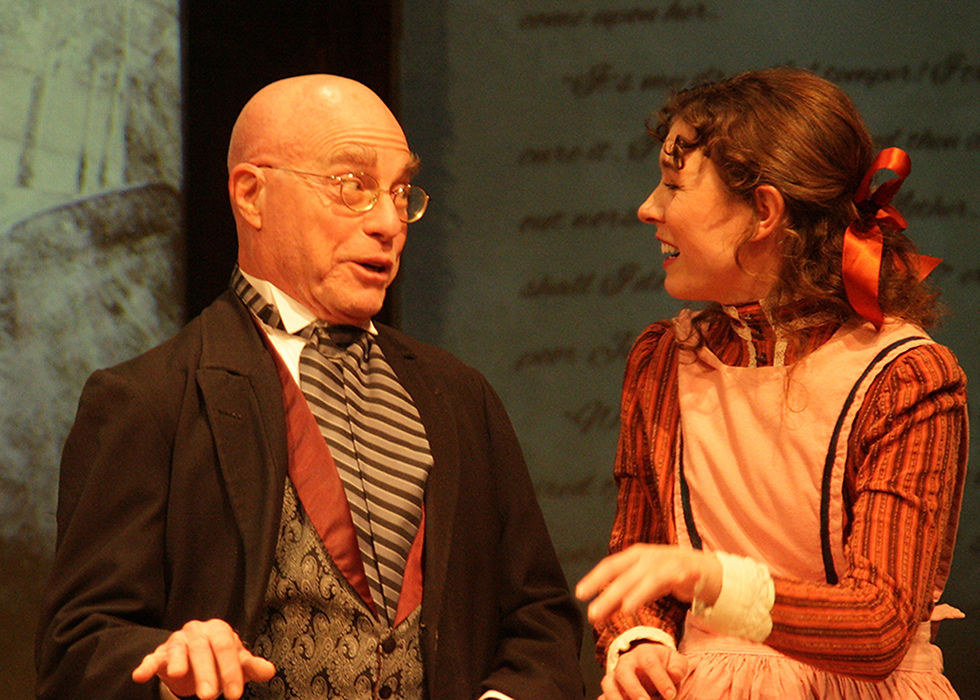
Meg (Katherine Chapman, “Into the Woods”), the oldest March sister, always responsible and kind, is the sister who first breaks the pledge of the March girls to be together forever. Ms. Chapman’s Meg has an elegant charm and looks to spare with a unique vocal brand that sets her apart. She portrays Meg with a small weakness for luxury and leisure, but also gentle, motherly, and morally vigorous. John Brooke (Christopher Diem, “American Idiot”), Laurie’s poor but virtuous tutor, forced to take a job as Laurie’s private teacher in order to support himself, and Meg have a simply beautiful duet together toward the end of Act I as they serenade each other in “More Than I Am.”
Beth, the pianist in the family, is played with sweetness and delicacy by Emily Abeles (“Fancy Nancy, The Musical”). The considerate and charitable Beth contracts scarlet fever after volunteering to nurse the sick children of her poor, German neighbors and is permanently weakened by the illness, eventually dying. This parallels the life of Louisa May Alcott’s real-life sister, Lizzie, who also died of scarlet fever. Ms. Abeles’ duet with Jo, “Some Things Are Meant to Be,” is a gentle highlight tearjerker, set against a simulated Cape Cod backdrop.
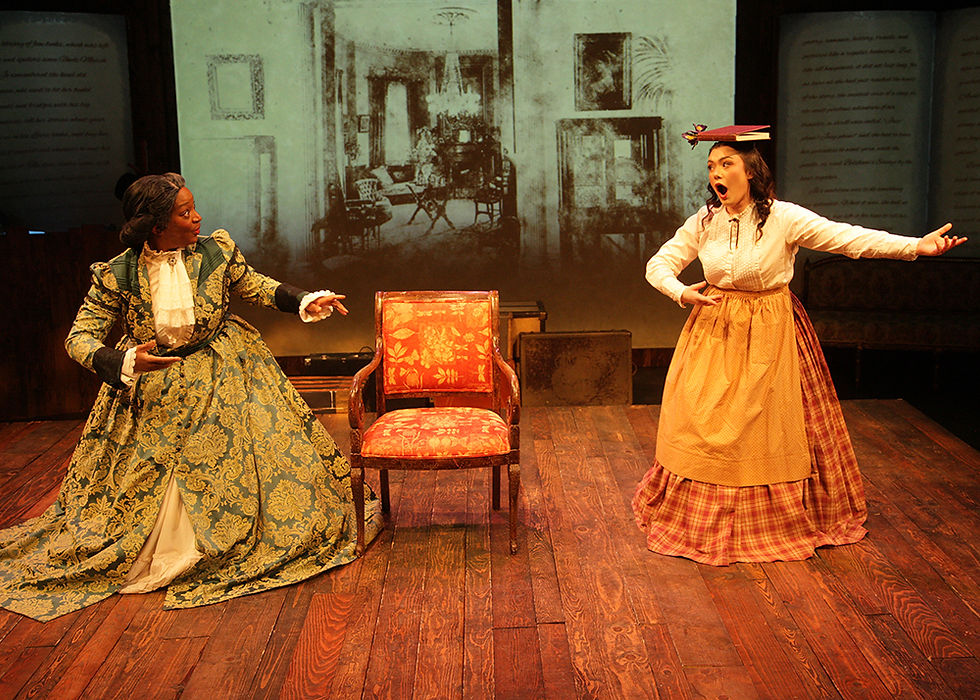
Amy (Camie Del Rosario, “The Marvelous Wonderettes”), the youngest March girl, adores visual beauty and has a weakness for pretty possessions. She is self-absorbed and given to pouting, fits of temper, and vanity, but she does attempt to improve herself, and is selected by Aunt March (also played by Jennifer Sparks) for a trip to Europe to be refined and cultured. While there, she unexpectedly sees Laurie, and they are soon married.
“Aunt March says that accessories are the key to a woman’s success!” says Amy. Her most featured song in the show is her incredible twosome with Laurie in the number, “The Most Amazing Thing.”
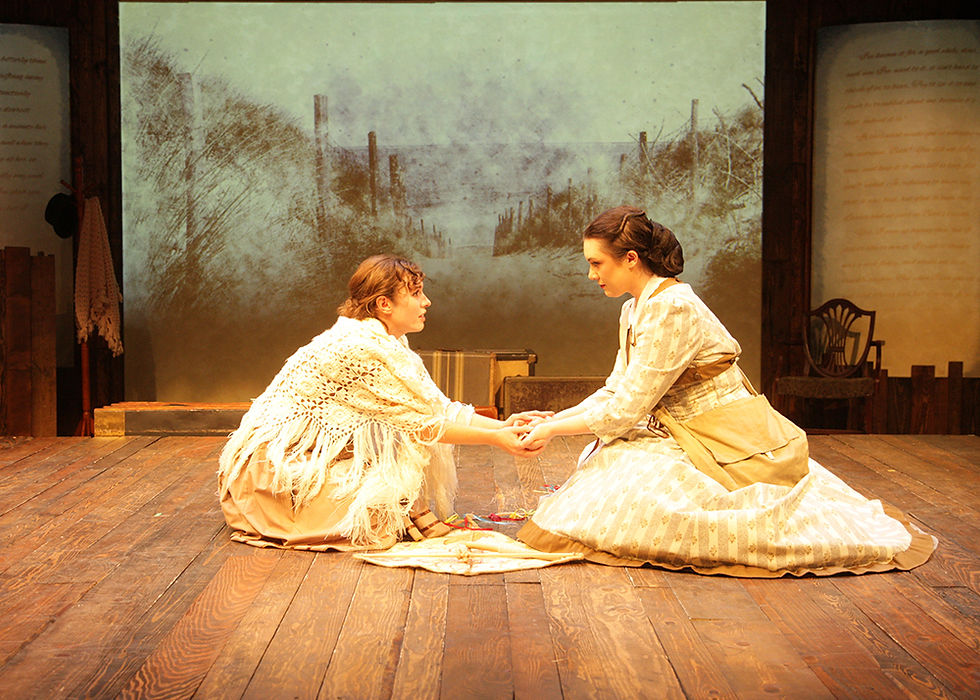
Zac Swan Van Lent’s Laurie is likable, and he brings boyish appeal and an assured composure to the part. Laurie is the rich boy who lives next door to the Marches and becomes like a son and brother to them. Laurie is charming, clever, and fancies himself a composer, until he realizes that he doesn't quite have the genius necessary to be truly great. In “Take a Chance on Me,” along with the aforesaid “The Most Amazing Thing,” Mr. Van Lent presents impressive vocal power with a spine-tingling finish.
The sole, welcome note of restraint is sounded by Maggie Randolph. In the midst of hyperactivity, Ms. Randolph’s Marmee, sagacious matriarch of the family, keeps a warmly affecting grip on an all-wise, supermom character, infusing the part with grit and impressive strength. When she sings “Here Alone,” while writing a letter to her husband, she powerfully shapes the big notes while caressing the softer ones. Her other exquisite solo, “Days of Plenty,” expresses maternal grief at the loss of her daughter Beth, and was deeply felt by the entire house.
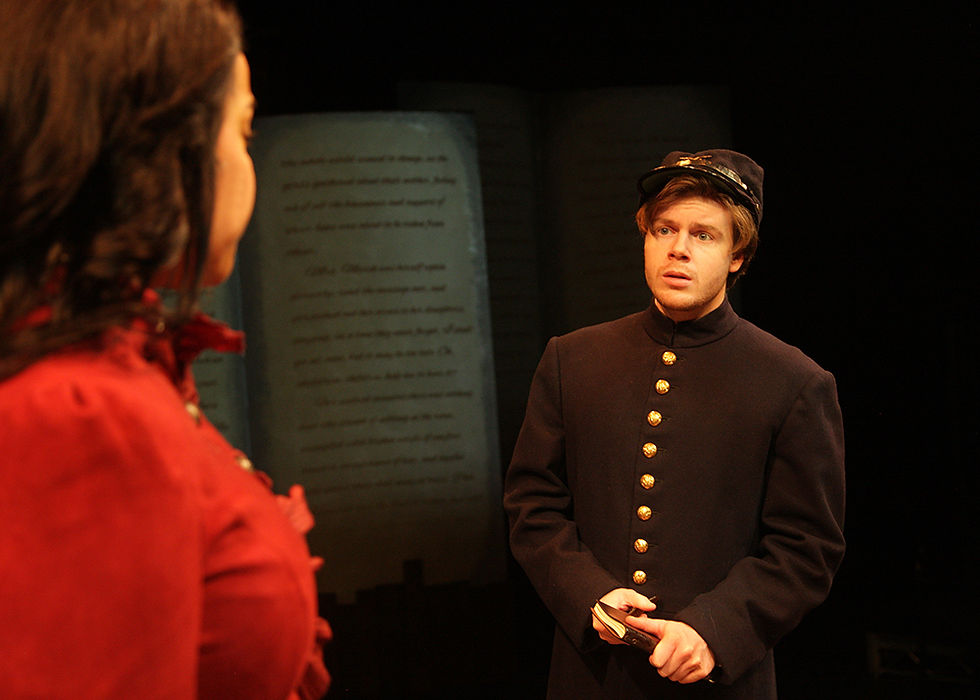
Allan Knee’s script presents a promising plot element — the vituperative clashes between Jo and Ms. Sparks’ socially conscious, domineering old fusspot Aunt March, which seems as if it should be more explosive, yet fades away with a heartfelt button. Jennifer Sparks adds just the right degree of acerbity to the role as the rich and etiquette-minded aunt, in total obverse of her role as Mrs. Kirk, Jo’s New York landlady. The duet, “Could You?” by Ms. Sparks and Ms. Pierce is sterling.
Knee also gives a sharp, combative edge to the friendship between Jo and Professor Bhaer (“How I Am”), who hides his growing affection for Jo with dueling ripostes. There’s dramatic urgency in their banter, and it’s unfortunate that the love affair is prematurely lopped off early in Act Two after Jo hurries home to care for sickly Beth. Luckily, that spark seems to reignite later in a beautiful duet finish by Mr. Boyes and Ms. Pierce with “Small Umbrella in the Rain.”
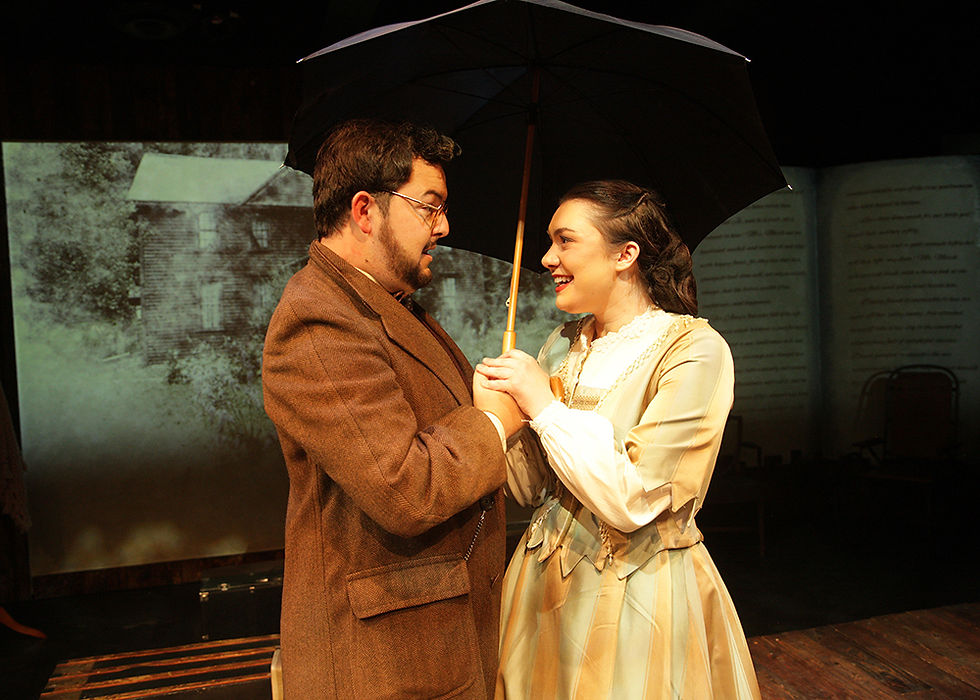
Glenn Koppel (“Emma, The Musical”) is a big standout as the wealthy, crabby Mr. Laurence, Laurie’s grandfather, whose cold heart is eventually warmed by the March family, especially Beth, and he takes her death very hard. His duet with her, “Off to Massachusettes” and reprise in Act Two is a catchy tune that stands out as being different than all the rest of the numbers with its jaunty melody and memorable little dips. And the one most probably you’ll be singing in the shower.
It’s a musical that refuses to feel tragic, and you will leave the theatre feeling you know these sisters as though they’re family. Through laughter, tears, and a profound uplifting of spirit, the March sisters will effortlessly wind their way into your heart, and gently take your breath away.
CHANCE THEATER PRESENTS, “LITTLE WOMEN – THE BROADWAY MUSICAL;” Based on the novel by Louisa May Alcott; with Book by Allan Knee; Music by Jason Howland; Lyrics by Mindi Dickstein. Director/Sound/Projection Designer: Casey Long; Music Director: Gabrielle Maldonado; Production Designer: Masako Tobaru; Costume Designer: Carole Zelinger; Stage Manager: Jordan Jones; Fight Director: Aaron McGee.
WITH: Sarah Pierce (Jo); Maggie Randolph (Marmee); Tucker Boyes (Professor Bhaer); Camie Del Rosario (Amy); Katherine Chatman (Meg); Emily Abeles (Beth); Glenn Koppel (Mr. Laurence); Zac Swan Van Lent (Laurie); Jennifer Sparks (Aunt March/Mrs. Kirk); and Christopher Diem (John Brooke).
“Little Women – The Broadway Musical” will preview from November 25th through December 2nd and opens December 3rd and continue through December 23rd at Chance Theater @Bette Aitken theater arts Center on the Cripe Stage with performances Wednesdays & Thursdays at 7:45PM, Fridays at 8PM, Saturdays at 3PM and 8PM, and Sundays at 3PM. Running time: 2 hours, 30 minutes with intermission.
For Tickets: https://www.chancetheater.com/
Chris Daniels
Arts & Entertainment Reviewer
The Show Report
Photo Credit: Doug Catiller, True Image Studio







Comments